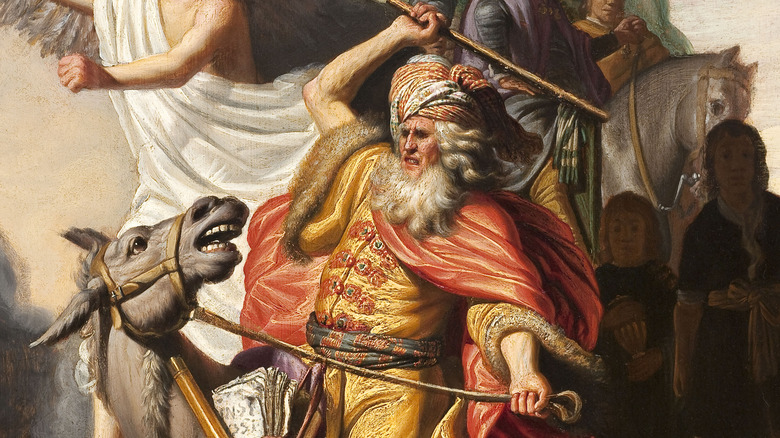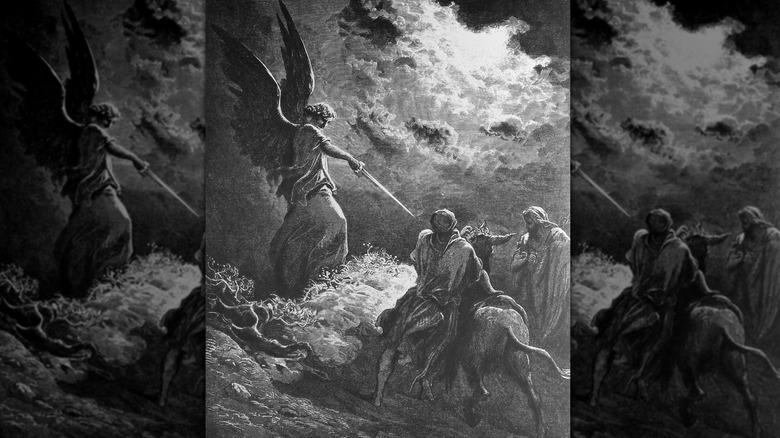The Astonishing Bible Story Of Balaam's Talking Donkey
Forty-year floods, 900-year old men, burning bushes, pillars of fire, leviathans, resurrections — the Bible has no shortage of fantastic beings and events. In that company, a talking donkey shouldn't be so odd. But for a modern reader of Numbers, it might seem strange that Balaam the diviner has no reaction to his mount's sudden power of speech.
Their story is told in Numbers 22 (via Bible Gateway). Just as the Israelites' 40 years of wandering was coming to an end and they could enter the land of Canaan, King Balak of Moab demanded that Balaam curse them, having seen them defeats two kings. Balaam initially refused Balak, protesting that he could not go against the word of God, who blessed the Israelites. God eventually let Balaam go to Balak, but was strangely angry with him at the same time (Apologetics Press says this stems from Balaam's greed overriding the specific conditions he was given). God sent an angel to slay Balaam — an angel that was at first only visible to the diviner's donkey.
Three times the donkey strayed from the angel's waiting strike on the road, and three times Balaam beat his mount. "Then the Lord opened the donkey's mouth," says Numbers, "and it said to Balaam, 'What have I done to you to make you beat me these three times?'" Balaam fired back, complaining that the donkey made him a fool and that he'd kill it if he had a sword.
God and the angel took the donkey's side
After hearing his donkey speak and responding by arguing with it, Balaam was allowed to behold the angel his beast had tried to avoid. The diviner fell before the spirit, who reprimanded him on the donkey's behalf. "Why have you beaten your donkey these three times?" the angel asked in Numbers 22:32. "I have come here to oppose you because your path is a reckless one before me." The angel told Balaam that had his faithful donkey not turned aside three times, he would have died — but the donkey would have been spared. Chastened, Balaam went onward at the angel's command, but was warned only to speak what the Lord told him to.
According to Chabad.org, other texts expand on Numbers' account of Balaam's humiliation and the importance of his donkey. The Zohar — the foundational text of Kabbalah — claims that the donkey was the source of Balaam's divination, and that turning them against each other anticipated God's decision to bend Balaam's powers to bless rather than curse the Israelites. In the Midrash, the donkey's sudden speech was taken as a sign that God is the master of speech and would put the words He wanted into Balaam's mouth. And in the Talmud, the donkey's arguments with Balaam are expanded so that the emissaries of King Balak overhear them and lose any confidence they may have had in Balaam's potential to curse and defeat Israel.
Balaam is a villain in Judeo-Christian thought
In Numbers 23, after the incident with his donkey, Balaam continued on to King Balak of Moab, but he warned the king that he could only do as bidden by God. Commanded three times to curse Israel, Balaam instead repeated words given to him by God and confirmed the Hebrews as a blessed nation. When Balak ordered Balaam away in a fury, the diviner shared four additional prophecies that foretold the expansion of Israel and the destruction of Moab. Having delivered God's message, Balaam went away, presumably on the same donkey.
Balaam may be a more confusing figure for how he's treated in later stories than for his donkey's sudden, temporary eloquence. Despite blessing Israel and repeatedly insisting that his powers cannot counteract the will of God, Balaam the diviner is treated as a villain. In Numbers 25, many of the Israelites were led astray by Moabite women to the worship of other gods, and both Jude and Revelation 2:14 claim that this was Balaam's work. Specifically, it was a roundabout way to claim the rewards Balak had promised the diviner if he cursed Israel. Balaam's donkey might have warned him against such wickedness, but so far as Numbers and the rest of the Bible are concerned, the animal never spoke again after its argument with its master on the road.


